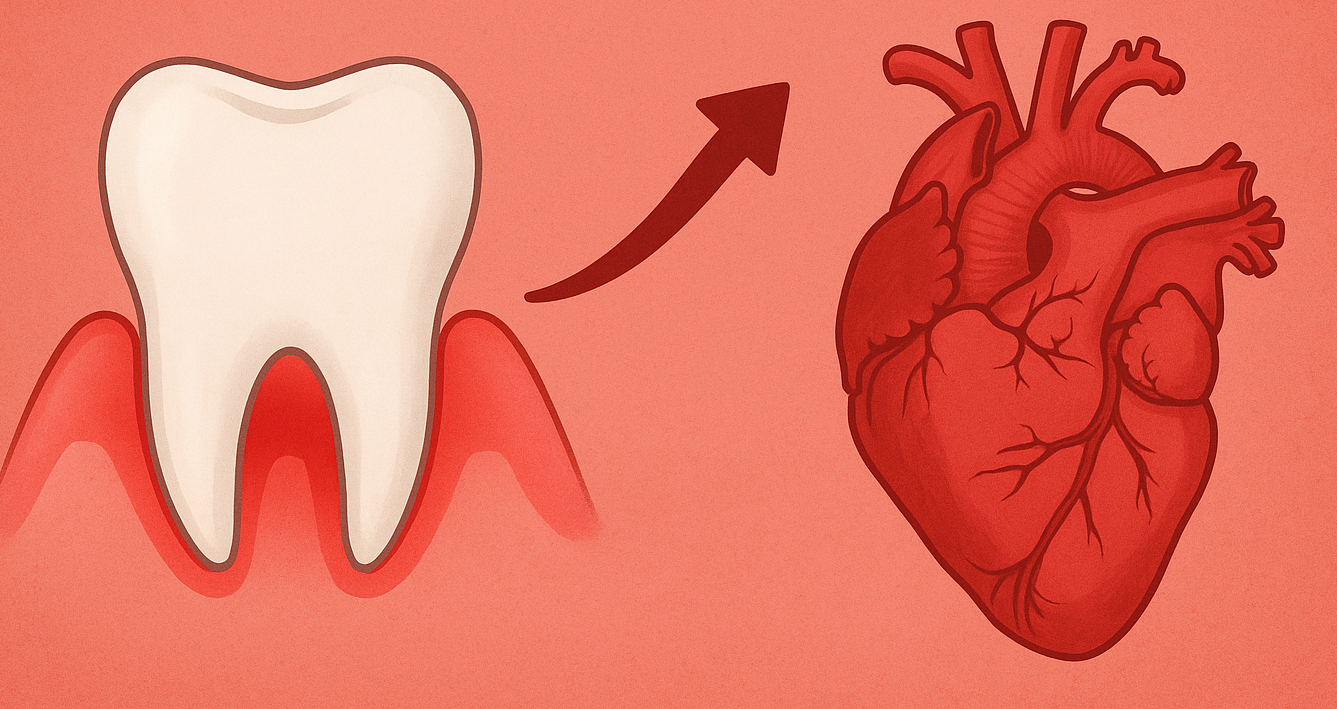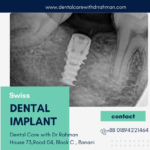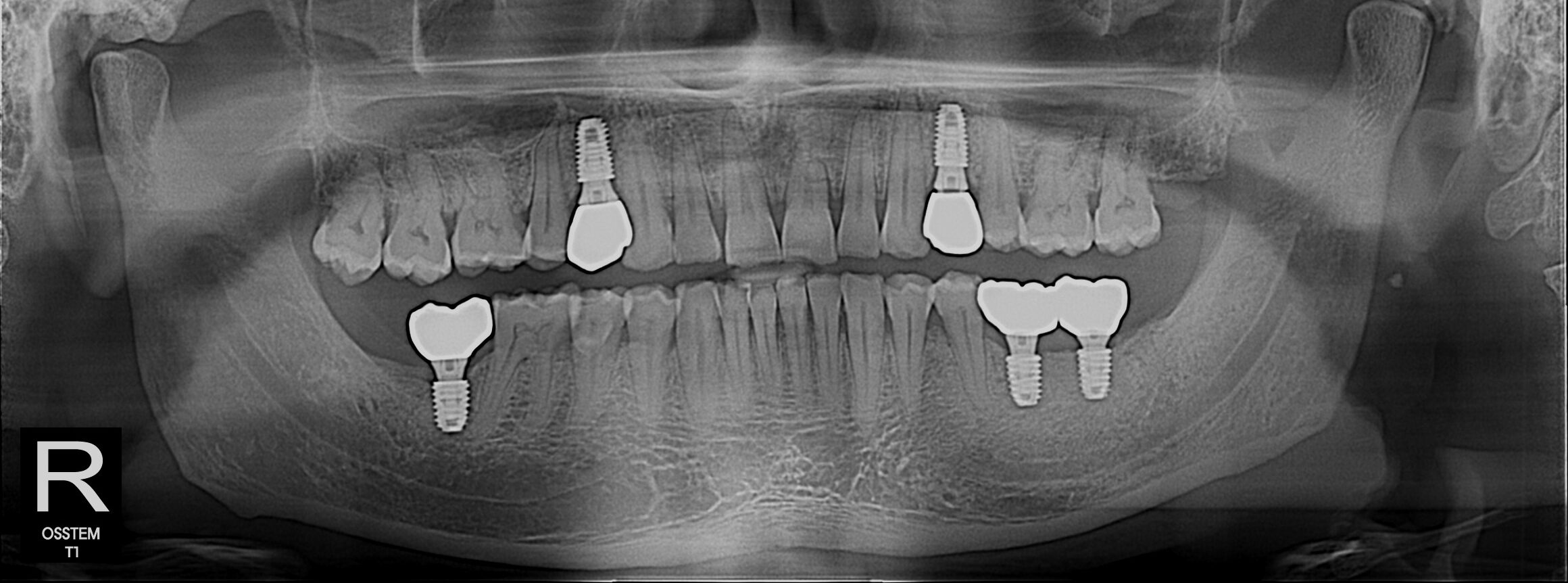When most people think about gum disease, they imagine bleeding gums, bad breath, or even tooth loss. But modern research has revealed that gum disease is much more than an oral health issue—it may also play a significant role in heart health. In fact, evidence suggests that people with gum disease are at a higher …
When most people think about gum disease, they imagine bleeding gums, bad breath, or even tooth loss. But modern research has revealed that gum disease is much more than an oral health issue—it may also play a significant role in heart health. In fact, evidence suggests that people with gum disease are at a higher risk of developing cardiovascular disease, including heart attack and stroke.
In this article, we’ll explore the connection between gum disease and heart disease, the science behind it, and what you can do to protect both your smile and your heart.
What Is Gum Disease?
Gum disease (periodontal disease) is a chronic infection of the gums and the supporting structures of the teeth. It usually begins as gingivitis, marked by red, swollen, or bleeding gums. If untreated, it can progress to periodontitis, a more severe stage where bacteria spread deeper below the gumline, leading to bone loss and loosening of teeth.
According to the World Health Organization (WHO), severe gum disease affects up to 19% of adults worldwide, making it one of the most common chronic diseases.
The Link Between Gum Disease and Heart Disease
Heart disease (cardiovascular disease) remains the leading cause of death globally, responsible for about 18 million deaths each year (WHO, 2021). Over the last two decades, researchers have consistently found an association between gum disease and cardiovascular conditions such as atherosclerosis, heart attack, and stroke.
1. Inflammation as the Common Pathway
Both gum disease and heart disease are driven by chronic inflammation. When gum tissues are infected, the body mounts an immune response, releasing inflammatory markers like C-reactive protein (CRP). These same markers are also elevated in people with cardiovascular disease.
A systematic review in the Journal of Clinical Periodontology (2019) found that patients with periodontitis had significantly higher CRP levels, linking oral inflammation to systemic inflammation that affects blood vessels and the heart.
2. Bacteria Entering the Bloodstream
The bacteria that cause gum disease—such as Porphyromonas gingivalis—can enter the bloodstream through infected gum tissue. Once in circulation, they may:
Attach to fatty deposits in blood vessels, contributing to atherosclerosis (hardening of the arteries).
Increase the risk of blood clots, which can trigger heart attack or stroke.
A study published in Circulation (2005) detected DNA from oral bacteria inside atherosclerotic plaques, showing that gum pathogens can travel and directly impact heart health.
3. Shared Risk Factors
Gum disease and heart disease share many common risk factors, including:
Smoking
Diabetes
Poor diet
Obesity
Stress
This overlap makes it difficult to prove a direct cause-and-effect relationship, but it strengthens the argument that maintaining gum health contributes to overall cardiovascular wellness.
How Strong Is the Evidence?
The American Heart Association (AHA) acknowledges a significant association between gum disease and cardiovascular disease. While researchers caution that gum disease may not directly cause heart disease, the evidence shows that people with periodontitis are 2–3 times more likely to experience a heart attack, stroke, or other cardiovascular events (Lockhart et al., AHA Scientific Statement, 2012).
Moreover, treatment of gum disease has been linked to improvements in cardiovascular health markers. For example:
A 2013 study in the Journal of the American Heart Association found that periodontal treatment improved blood vessel function within months.
Another clinical trial showed reductions in systemic inflammation (CRP levels) after non-surgical gum treatment.
This suggests that managing gum disease may not only improve oral health but also support heart health.
Who Is at Risk?
Certain groups are at higher risk of developing both gum disease and heart disease:
People over 40
Smokers
Patients with diabetes or uncontrolled blood sugar
Individuals with high blood pressure or high cholesterol
Those with a family history of cardiovascular disease
If you fall into these categories, paying extra attention to your oral hygiene and scheduling regular dental check-ups can make a real difference.
Protecting Your Gums, Protecting Your Heart
Here are practical, evidence-based steps you can take:
Brush and Floss Daily
Brush twice a day with fluoride toothpaste and floss once daily to remove plaque that causes gum inflammation.See Your Dentist Regularly
Professional cleanings help remove tartar and detect early signs of gum disease before it becomes severe.Quit Smoking
Smoking is one of the strongest risk factors for both gum and heart disease. Quitting significantly reduces your risk.Control Diabetes and Blood Pressure
Managing these conditions helps lower inflammation and reduces complications in both your mouth and heart.Adopt a Heart-Healthy Diet
Diets rich in fruits, vegetables, whole grains, and omega-3 fatty acids benefit both oral and cardiovascular health.Seek Periodontal Treatment
If you already have gum disease, timely treatment—whether through scaling and root planing, antibiotics, or surgery—can reduce bacterial load and inflammation.
Final Thoughts
The connection between gum disease and heart disease is clear: oral health is deeply linked to overall health. While scientists are still studying the exact biological mechanisms, decades of evidence confirm that people with gum disease face a higher risk of cardiovascular problems.
Taking care of your gums is not just about keeping your smile healthy—it’s also a step toward protecting your heart. By practicing good oral hygiene, maintaining regular dental visits, and managing lifestyle risk factors, you can significantly reduce your chances of developing both gum disease and heart disease.
Your dentist is not just your partner in oral health but also in your general well-being. A healthier mouth may mean a healthier heart.
Read:
https://health.clevelandclinic.org/can-mouth-gum-disease-really-cause-heart-problems
Book Your Dental Consultation Today
If you’re considering schedule a consultation with Dr. Rahman to learn about your options, costs, and expected outcomes book an appointment today.
Contact Address:
Address: House: 73 Block C, Road: 04, Dhaka 1213
website: www.dentalcarewithdrrahman.com






